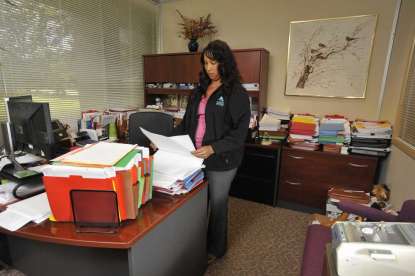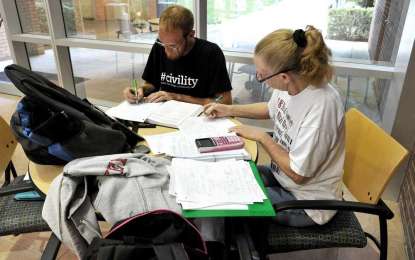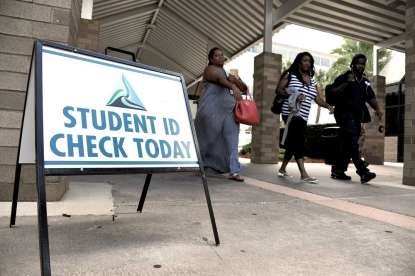
Originally published in the Florida Times-Union
Michelle Fleck takes classes at Florida State College at Jacksonville because going to college feels like the proper thing to do.
However, she doesn’t know what she wants to study, which classes she should take next semester or who is her academic adviser. She hasn’t had guidance from anyone at the college since she first enrolled in summer 2012.
“I thought eventually I’d figure out what I wanna do, like a year in,” Fleck said. “I didn’t take the time to learn what it takes to finish, and they didn’t really inform me on who to ask.”
An exact number is tough to pin down, but at FSCJ the vast majority of 60,000 students are like Fleck, rookies to higher education who enroll without a career path. Making sure undecided students have an intended major is one of several issues awaiting the new FSCJ president, who may be chosen as soon as Tuesday.
Almost immediately when he or she walks in, the new college leader will have to take the lead on negotiating new faculty salaries, repairing the college’s public image and retooling how academic advisers communicate with first-year students.
For a college still staggering over negative headlines in 2012, the new president will need to rebuild FSCJ’s public image and reputation. Doing so, however, will take more than smiles at public appearances across Jacksonville. The new president will have to embody integrity by making sure students finish what they started.
At FSCJ’s eight locations, faculty and staff need reassurance that the financial-aid mistakes of the past have been resolved and no one dealing with public dollars is being extravagant in spending. While FSCJ’s interim president, Will Holcombe, has done some of the repair work, it’s clear that the new president won’t have a cushion job.
“At the heart of it, the new president will have to make sure that FSCJ is operating well, being transparent, and meeting the needs of those students,” said Randy Hanna, chancellor of the Florida State College system.
STUDENTS NEED A PLAN
Thousands of FSCJ students, particularly those aiming for an associate’s degree, walk in without a declared major. Before students reach 24 credits (about 40 percent of the way to an associate’s degree), it’s up to one of the college’s 88 academic advisers to help them find a path.
There’s a push within the college to redesign academic advising. Students would write a potential plan of study rather than hold a vague conversation with an adviser that often goes nowhere. The MAP, or Make A Plan, program adds a professor and a campus coordinator in the room during advising. The plan also puts pressure on the student to visit the adviser more often.
FSCJ leaders say these steps are important because their research shows that students with no plan typically don’t graduate. The college’s graduation rate has hovered in the low-30 percent range since it began offering bachelor’s degrees in 2007-08.
If MAP is approved by an accrediting council that will visit FSCJ Oct. 14, it would be unveiled this month and five campus coordinators will be hired. FSCJ Vice President Judith Bilsky said MAP’s ultimate success will depend upon a new president who is willing to adjust future budgets to pay for staffing, professional development and new coordinators, which is about $350,000 this year.

“The new president needs to be supportive of that and needs to get faculty behind it,” Bilsky said. “It was up to the student when they saw an adviser, but there’s a better chance a student will succeed if they follow a plan.”
Fleck wants to graduate, but she hasn’t decided on a major because none of the classes have sparked her interest. She said she doesn’t visit the academic advising office because she’s embarrassed to admit to the student assistants, who are her age, that she’s lost.
If someone much older approached her to give guidance on future classes, Fleck said, she would meet with an adviser more often.
“I would just ask them where am I supposed to go from here,” she said.
PRICE OF CREDIBILITY
FSCJ’s reputation is still sensitive after financial-aid officers wrongfully awarded Pell grants to more than 1,300 students last year. When the mistakes were found, leaders initially said students would have to pay back the $4.2 million. Jacksonville attorney Bill Scheu, who investigated what went wrong, told board trustees that a lax financial-aid culture was the main culprit. His 20-page report suggested ways to tighten the office’s procedures. The college later used its own scholarship funds to forgive the students and pay back the Department of Education.
In the midst of financial-aid woes, the Times-Union found that President Steve Wallace overspent his expense accounts. After the articles appeared, Gov. Rick Scott called for an investigation. The Inspector General issued a report last month that detailed what new policies FSCJ could adopt to make sure overspending doesn’t happen again. One finding from the report showed that there was little to no documentation when Wallace expensed things to FSCJ’s foundation.
FSCJ’s board decided not to renew Wallace’s contract and hired Holcombe as interim president.
Holcombe has done some of the toughest work to repair FSCJ, including reorganizing the college, balancing the 2013-14 budget and playing host for the college’s accreditation visit this month. He said the college has adopted all the suggestions from Scheu’s report, and the $4.2 million owed to the federal government has been paid. The next big step for the new president, Holcombe said, is to overhaul the college’s strategic plan.

There’s still one piece of information FSCJ must give the education department, Holcombe said. The department wants to review the transcripts of certain students from 2010-11 and 2011-12 to make sure those students didn’t change or drop out of an academic program that warranted receiving financial aid.
If some did, it would mean the college could owe more money and the new college president would have to decide how and when to pay. But for now, it will take months for the education department to finish that review, Holcombe said.
PROFS PUSHING FOR PAY
The average FSCJ professor earns $48,000 a year, compared with $51,000 at St. Johns River State College and $56,000 at Daytona State College, according to a 2013 salary review from the National Education Association.
Professors at every FSCJ campus are teaching one or two more classes than their required 10 classes a year to supplement these salaries, said Karen Morian, a humanities professor who doubles as the faculty union president.
“I watch my colleagues pushing themselves to the wall just to make some money,” Morian said. “People are still pushing and pushing and pushing, but there’s only so many papers you can grade, so many students you can have in your office hours.”
Morian said she hopes the new FSCJ president will make higher professor salaries a priority. She said making salaries competitive with other Florida state colleges is the best way to keep professors and attract new ones.
Jason Gibson, another humanities professor, agreed with Morian’s salary analysis. He said professors need decent salaries because they are paying off student loans as well.
Gibson added a second issue that faculty face.
“Our students are underprepared,” said Gibson, FSCJ’s faculty senate president.
About 65 percent of students enrolling at FSCJ need remediation classes. Gibson said he’s looking for the new president to come up with a plan to bring struggling students up to speed, particularly in reading and math.
“If I were the new president, I would be thinking ‘How can we get our students prepared for college classes?’ Because that will ripple throughout this institution.”
WORK INSIDE AND OUT
While FSCJ awaits the education department’s review, there are some internal fixes to make, including upgrading technology, hiring new campus leaders and deciding how to expand dual enrollment.
The college’s 15-year-old computer software for managing records, named Orion, will be scrapped. The college set aside $10 million for a new system. The new president will recommend which vendor to hire.
FSCJ is behind on the upgrade because, with limited dollars, the previous administration put technology upgrades in the classroom.

“To their credit, they put students first, but Orion touches students, too,” Bilsky said. “Now, and clearly we’re behind, it’s time to pay attention to upgrades on our business systems.”
The college also has about 60 positions to fill before July 1, including higher-level spots like general counsel, executive director of the foundation and downtown campus president.
Off-campus, the new president also must build relationships with the business community, local superintendents, university presidents and legislators. Hanna, the system chancellor, said the key is listening carefully during those first few months and being visible around campus.
“Being honest, transparent and ethical is critical,” he said.